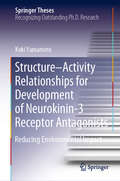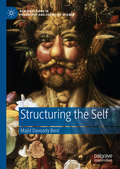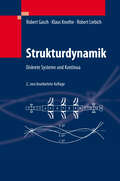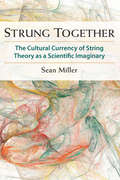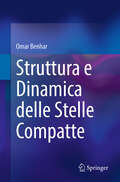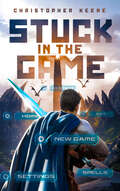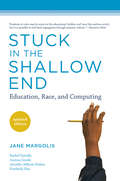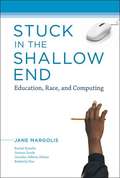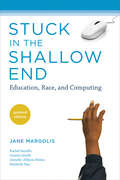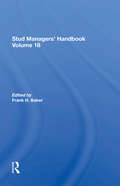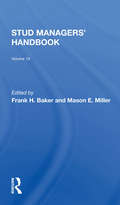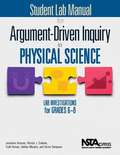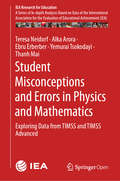- Table View
- List View
Structures: Graphical Statics and Analysis
by Edmond SaliklisGraphic methods for structural design essentially translate problems of algebra into geometric representations, allowing solutions to be reached using geometric construction (ie: drawing pictures) instead of tedious and error-prone arithmetic. This was the common method before the invention of calculators and computers, but had been largely abandoned in the last half century in favor of numerical techniques. However, in recent years the convenience and ease of graphic statics has made a comeback in architecture and engineering. Several professors have begun using graphic statics in the classroom.and.studio environment. But until now, there had been no guidebook that rapidly brings students up to speed on the fundamentals of how to create graphical solutions to statics problems.Graphic Statics introduces all of the traditional graphic statics techniques in a parametric drawing format, using the free program GeoGebra. Then, advanced topics such as indeterminate beams and three dimensional curved surfaces are be covered. Along the way, links to wider design ideas are introduced in a succinct summary of the steps needed to create elegant solutions to many staticequilibrium problems.Meant for students in civil and architectural engineering, architecture,and construction, this practical introduction will also be useful to professionals looking to add the power of graphic statics to their work.
Structure–Activity Relationships for Development of Neurokinin-3 Receptor Antagonists: Reducing Environmental Impact (Springer Theses)
by Koki YamamotoThis book explores the possible development of neurokinin-3 receptor (NK3R) antagonists with reduced environmental impact. Pharmaceuticals are used to cure diseases and to alleviate symptoms in humans and animals. However, the stable, bioactive substances excreted by patients have unfavorable effects on non-target species. To overcome these disadvantages of these highly stable, potent substances, drug design to turn off bioactivity after release into the environment is needed. The book describes the development of eco-friendly NK3R antagonists by introducing a labile functional moiety and substituting a scaffold. This resulted in a novel NK3R antagonist that oxidized into its inactive form when exposed to air. Further, the book presents an efficient and easily achievable synthetic method of creating triazolopiperazine scaffolds, as well as a structure–activity relationship study involving scaffold hopping for decomposable motifs, which led to a novel photodegradable NK3R antagonist. Demonstrating that it is possible to develop compounds that convert into their inactive forms under environmental conditions, this book is useful for anyone interested in therapeutic agents with reduced environmental impact.
Structuring the Self (New Directions in Philosophy and Cognitive Science)
by Majid Davoody BeniThis book presents a unified account of the self, based on a network of knowledge sourced from several scientific accounts of selfhood. Beni constructs his ontological account of the self from the common structure that underpins the theoretical diversity that is manifested in rival and sometimes incompatible scientific accounts of the self and its aspects. The enterprise is inspired by recent structural realist theories in the philosophy of science, specifying the basic structure of the self, and explaining how representational, phenomenal, and social aspects of the self are embodied within this structure.
Strukturdynamik
by Robert Liebich Klaus Knothe Robert GaschDas Buch behandelt diskrete schwingungsfähige Systeme und beschreibt Analyseverfahren und Algorithmen zur Aufstellung von Bewegungsdifferentialgleichungen allgemeiner linearer Mehrkörpersysteme. Die Neuauflage vereint die Bände "Strukturdynamik I und II" (Gasch/Knothe) und legt im Bereich der numerischen Behandlung von Schwingungssystemen den Schwerpunkt auf die industrielle Anwendung. Das Buch wurde als Lehrbuch für Hochschulen und Fachhochschulen konzipiert, eignet sich aber auch zum Selbststudium für Ingenieure in Forschung und Industrie.
Strukturgleichungsmodellierung: Eine anwendungsorientierte Einführung in die Kausalanalyse mit Hilfe von AMOS, SmartPLS und SPSS
by Marko Sarstedt Rolf WeiberStrukturgleichungsmodelle stellen das Standardinstrument zur empirischen Prüfung von hypothetisierten Beziehungen zwischen theoretischen Konstrukten (latenten Variablen) dar. Das Buch zeichnet den gesamten Prozess der Strukturgleichungsmodellierung von der Konzeptualisierung theoretischer Konstrukte über die Spezifikation von Messmodellen, die Reliabilitäts- und Validitätsprüfung mittels konfirmatorischer Faktorenanalyse bis hin zur Prüfung von kausalen Wirkungshypothesen auf Basis der Kovarianzstrukturanalyse sowie der Partial Least Squares-Pfadmodellierung nach.Die einzelnen Analysen werden so erläutert, dass geringstmögliche mathematische Vorkenntnisse erforderlich sind. Alle Arbeitsschritte werden an einem durchgehenden Fallbeispiel unter Verwendung von SPSS, AMOS und SmartPLS veranschaulicht. Zu allen Arbeitsschritten werden klare Anwendungsempfehlungen sowie Hinweise zum Umgang mit unerwarteten Analyseergebnissen gegeben. Die Verwendung der jeweiligen Software wird ausführlich durch Screenshots erläutert. Für die 3. Auflage wurde das Buch umfassend überarbeitet, um die jüngsten methodischen Entwicklungen abzudecken. Besonderer Fokus wurde auf die Ausführungen zur PLS-Pfadmodellierung und Darstellung alternativer Schätzverfahren der Kausalanalyse gelegt. Das Angebot wurde zudem um digitale Lernkarten (Flashcards) erweitert, welche es dem Leser ermöglichen, das Wissen aus dem Buch zu vertiefen.Die ZielgruppenDas Buch richtet sich an Studierende und Lehrende in Master- und Doktorandenprogrammen sowie an Anwender aus der Unternehmens- und insbesondere Marktforschungspraxis. Es ist von besonderem Nutzen für alle, die Wirkungshypothesen zwischen latenten Variablen empirisch prüfen möchten. Das Fallbeispiel ist so allgemein gehalten, dass der Anwender die Analysen leicht auf spezifische Fragen und Probleme in seinen jeweiligen Anwendungsfeldern übertragen kann.Über die Internetseite www.strukturgleichungsmodellierung.de haben die Leserinnen und Leser Zugriff auf alle im Buch verwendeten Datensätze und Analyseskripte sowie weitere Serviceleistungen.
Strung Together: The Cultural Currency of String Theory as a Scientific Imaginary
by Sean MillerIn Strung Together: The Cultural Currency of String Theory as a Scientific Imaginary, Sean Miller examines the cultural currency of string theory, both as part of scientific discourse and beyond it. He demonstrates that the imaginative component of string theory is both integral and indispensable to it as a scientific discourse. While mathematical arguments provide precise prompts for physical intervention in the world, the imaginary that supplements mathematical argument within string theory technical discourse allows theorists to imagine themselves interacting with the cosmos as an abstract space in such a way that strings and branes as phenomena become substantiated and legitimized. And it is precisely this sort of imaginary--which Miller calls a scientific imaginary--duly substantiated and acculturated, that survives the move from string theory technical discourse to popularizations and ultimately to popular and literary discourses. In effect, a string theory imaginary legitimizes the science itself and helps to facilitate a virtual domestication of a cosmos that was heretofore remote, alien, and incomprehensible.
Struttura e Dinamica delle Stelle Compatte
by Omar BenharQuesto libro si propone di fornire un'introduzione, allo stesso tempo accessibile e completa, alle stelle compatte. Dopo una prima parte dedicata alla fisica delle nane bianche, nella parte centrale del volume vengono analizzate la struttura e la dinamica delle stelle di neutroni. Particolare attenzione è rivolta ai modelli utilizzati per la descrizione della materia stellare a livello microscopico. Questi modelli sono altamente multidisciplinari, in quanto abbracciano campi di ricerca che vanno dalla fisica nucleare e delle particelle elementari alla fisica della materia condensata all'astrofisica. Tutti gli argomenti sono trattati con un approccio pedagogico, facendo riferimento allo sviluppo storico delle osservazioni astronomiche e degli studi teorici. Ampio spazio è dedicato alla discussione dell'impatto dei risultati sperimentali più recenti, come la rivelazione di onde gravitazionali, e dei dati senza precedenti che saranno disponibili nella nascente era dell'astronomia multimessaggera. Questo volume vuole offrire agli studenti di dottorato in fisica ed astrofisica delle solide basi per la loro futura carriera scientifica. I ricercatori già impegnati nei campi della fisica nucleare e delle particelle, così come nell'astrofisica a nella fisica gravitazionale, lo troveranno un utile strumento di consultazione.
Strömungsgeräusche (Fachwissen Technische Akustik)
by Michael Möser Gerhard MüllerDieser Band der Reihe Fachwissen Technische Akustik behandelt Schallquellen, bei denen die Schallentstehung auf aerodynamische bzw. hydrodynamische Strömungsvorgänge zurückzuführen ist oder bei denen Strömungsvorgänge zumindest eine wesentliche Einflussgröße darstellen. Die Kapitel erläutern die Schallentstehung durch Strömungen an einigen typischen Beispielen.
Stuck in the Game
by Christopher KeeneNoah promised himself he would never play the world&’s most popular MMORPG—the Dream State. He&’d already lost too many friends to the addictive virtual world. But after a devastating car crash leaves Noah paralyzed, he&’s forced inside the game. The Dream State not only provides a connection with the outside world but also keeps his brain awake long enough for his body to heal. Dying in the game, however, could send Noah into a coma forever. To stay safe, he must remain in the lower levels, far away from the most dangerous monsters and players. Meanwhile, doctors grow concerned when Noah&’s girlfriend, Sue—who also sustained serious injuries in the crash—seemingly fails to connect to the game. When a mysterious avatar suggests to Noah that the last remnants of Sue&’s consciousness are being held prisoner in the highest level, Noah decides to risk everything to save her. Leaving the safety of the lower levels, Noah rises through the ranks and enters the most dangerous part of the game, allying with high-level players and unearthing clues to a sinister plot along the way. Now top players from across the world are hunting him. With his life on the line, can Noah save Sue and uncover the mystery?
Stuck in the Shallow End, updated edition: Education, Race, and Computing
by Jane MargolisWhy so few African American and Latino/a students study computer science: updated edition of a book that reveals the dynamics of inequality in American schools.The number of African Americans and Latino/as receiving undergraduate and advanced degrees in computer science is disproportionately low. And relatively few African American and Latino/a high school students receive the kind of institutional encouragement, educational opportunities, and preparation needed for them to choose computer science as a field of study and profession. In Stuck in the Shallow End, Jane Margolis and coauthors look at the daily experiences of students and teachers in three Los Angeles public high schools: an overcrowded urban high school, a math and science magnet school, and a well-funded school in an affluent neighborhood. They find an insidious “virtual segregation” that maintains inequality. The race gap in computer science, Margolis discovers, is one example of the way students of color are denied a wide range of occupational and educational futures. Stuck in the Shallow End is a story of how inequality is reproduced in America—and how students and teachers, given the necessary tools, can change the system. Since the 2008 publication of Stuck in the Shallow End, the book has found an eager audience among teachers, school administrators, and academics. This updated edition offers a new preface detailing the progress in making computer science accessible to all, a new postscript, and discussion questions (coauthored by Jane Margolis and Joanna Goode).
Stuck in the Shallow End: Education, Race, and Computing
by Jane Margolis Jennifer Jellison Holme Joanna Goode Kim Nao Rachel EstrellaThe number of African Americans and Latino/as receiving undergraduate and advanced degrees in computer science is disproportionately low, according to recent surveys. And relatively few African American and Latino/a high school students receive the kind of institutional encouragement, educational opportunities, and preparation needed for them to choose computer science as a field of study and profession. In Stuck in the Shallow End, Jane Margolis looks at the daily experiences of students and teachers in three Los Angeles public high schools: an overcrowded urban high school, a math and science magnet school, and a well-funded school in an affluent neighborhood. She finds an insidious "virtual segregation" that maintains inequality. Two of the three schools studied offer only low-level, how-to (keyboarding, cutting and pasting) introductory computing classes. The third and wealthiest school offers advanced courses, but very few students of color enroll in them. The race gap in computer science, Margolis finds, is one example of the way students of color are denied a wide range of occupational and educational futures. Margolis traces the interplay of school structures (such factors as course offerings and student-to-counselor ratios) and belief systems -- including teachers' assumptions about their students and students' assumptions about themselves. Stuck in the Shallow End is a story of how inequality is reproduced in America -- and how students and teachers, given the necessary tools, can change the system.
Stuck in the Shallow End: Education, Race, and Computing (The\mit Press Ser.)
by Jane MargolisAn investigation into why so few African American and Latino high school students are studying computer science reveals the dynamics of inequality in American schools.The number of African Americans and Latino/as receiving undergraduate and advanced degrees in computer science is disproportionately low, according to recent surveys. And relatively few African American and Latino/a high school students receive the kind of institutional encouragement, educational opportunities, and preparation needed for them to choose computer science as a field of study and profession. In Stuck in the Shallow End, Jane Margolis looks at the daily experiences of students and teachers in three Los Angeles public high schools: an overcrowded urban high school, a math and science magnet school, and a well-funded school in an affluent neighborhood. She finds an insidious “virtual segregation” that maintains inequality. Two of the three schools studied offer only low-level, how-to (keyboarding, cutting and pasting) introductory computing classes. The third and wealthiest school offers advanced courses, but very few students of color enroll in them. The race gap in computer science, Margolis finds, is one example of the way students of color are denied a wide range of occupational and educational futures. Margolis traces the interplay of school structures (such factors as course offerings and student-to-counselor ratios) and belief systems—including teachers' assumptions about their students and students' assumptions about themselves. Stuck in the Shallow End is a story of how inequality is reproduced in America—and how students and teachers, given the necessary tools, can change the system.
Stud Managers' Handbook, Vol. 18
by Frank H. BakerThe Stud Managers' Handbook includes presentations made at the International Stockmen's School, January 2-6, 1983. The faculty members of the School who authored th is eighteenth volume of the Handbook, along with books on Dairy Cattle, Beef Cattle, and Sheep and Goats, are scholars, stockmen, and agribusiness leaders with national and international reputations. The papers are a mixture of tried and true technology and practices with new concepts from the latest research results of experiments in all parts of the world. Relevant information and concepts from many related disciplines are included.
Stud Managers' Handbook, Vol. 19
by Frank H Baker Mason MillerThe 1984 International Stockmen's School Handbooks include more than 200 technical papers presented at this year's Stockmen's School, sponsored by Winrock International. The authors of these papers are outstanding animal scientists, agribusiness leaders, and livestock producers who are expert in animal technology, animal management, and general fields relevant to animal agriculture. The Handbooks present advanced technology in a problem-oriented form readily accessible to livestock producers, operators of family farms, managers of agribusinesses, scholars, and students of animal agriculture. The Beef Cattle Science Handbook, the Dairy Science Handbook, the Sheep and Coat Handbook, and the Stud Managers' Handbook each include papers on such general topics as genetics and selection; general anatomy and physiology; reproduction; behavior and animal welfare; feeds and nutrition; pastures, ranges, and forests; health, diseases, and parasites; buildings, equipment, and environment; animal management; marketing and economics (including product processing, when relevant); farm and ranch business management and economics; computer use in animal enterprises; and production systems. The four Handbooks also contain papers specifically related to the type of animal considered.
Student Journal Earth and Space Systems - 5.ES.NGSS
by Battle Creek Area Mathematics and Science CenterA Fifth Grade Unit supporting the Next Generation Science Standards and the Michigan Science Standards
Student Journal Energetic Connections - 6PS
by Battle Creek Area Mathematics And Scien CenterA Sixth Grade Unit supporting the Michigan Science K-7 Content Expectations
Student Journal Energy in an Ecosystem - 6LS
by Battle Creek Area Mathematics and Science CenterA Sixth Grade Unit supporting the Michigan Science K-7 Content Expectations
Student Journal Matter and Energy in an Ecosystem - 5.LS.NGSS
by Battle Creek Area Mathematics And Scien CenterA Fifth Grade Unit supporting the Next Generation Science Standards and the Michigan Science Standards
Student Journal The Planet Rock - 6ES1
by Battle Creek Area Mathematics and Science CenterA Sixth Grade Unit supporting the Michigan Science K-7 Content Expectations
Student Journal Yesterday Today and Tomorrow - 6ES2
by Battle Creek Area Mathematics and Science CenterA Sixth Grade Unit supporting the Michigan Science K-7 Content Expectations
Student Lab Manual for Argument-driven Inquiry in Physical Science: Lab Investigations for Grades 6-8
by Patrick Enderle Victor Sampson Jonathon Grooms Todd Hutner Ashley MurphyAre you interested in using argument-driven inquiry for middle school lab instruction but just aren’t sure how to do it? Argument-Driven Inquiry in Physical Science will provide you with both the information and instructional materials you need to start using this method right away. The book is a one-stop source of expertise, advice, and investigations to help physical science students work the way scientists do. Student Lab Manual for Argument-Driven Inquiry in Life Science provides the student materials you need to guide your students through these investigations. With lab details, student handouts, and safety information, your students will be ready to start investigating.
Student Misconceptions and Errors in Physics and Mathematics: Exploring Data from TIMSS and TIMSS Advanced (IEA Research for Education #9)
by Teresa Neidorf Alka Arora Ebru Erberber Yemurai Tsokodayi Thanh MaiThis open access report explores the nature and extent of students’ misconceptions and misunderstandings related to core concepts in physics and mathematics and physics across grades four, eight and 12. Twenty years of data from the IEA’s Trends in International Mathematics and Science Study (TIMSS) and TIMSS Advanced assessments are analyzed, specifically for five countries (Italy, Norway, Russian Federation, Slovenia, and the United States) who participated in all or almost all TIMSS and TIMSS Advanced assessments between 1995 and 2015.The report focuses on students’ understandings related to gravitational force in physics and linear equations in mathematics. It identifies some specific misconceptions, errors, and misunderstandings demonstrated by the TIMSS Advanced grade 12 students for these core concepts, and shows how these can be traced back to poor foundational development of these concepts in earlier grades. Patterns in misconceptions and misunderstandings are reported by grade, country, and gender. In addition, specific misconceptions and misunderstandings are tracked over time, using trend items administered in multiple assessment cycles. The study and associated methodology may enable education systems to help identify specific needs in the curriculum, improve inform instruction across grades and also raise possibilities for future TIMSS assessment design and reporting that may provide more diagnostic outcomes.
Student Notebook, Middle School Life Science (STEMscopes™ CA-NGSS 3D)
by Rice University Inc. Accelerate LearningNIMAC-sourced textbook
Student Notebook, Middle School Physical Science (STEMscopes™ CA-NGSS 3D)
by Rice University Inc. Accelerate LearningNIMAC-sourced textbook

